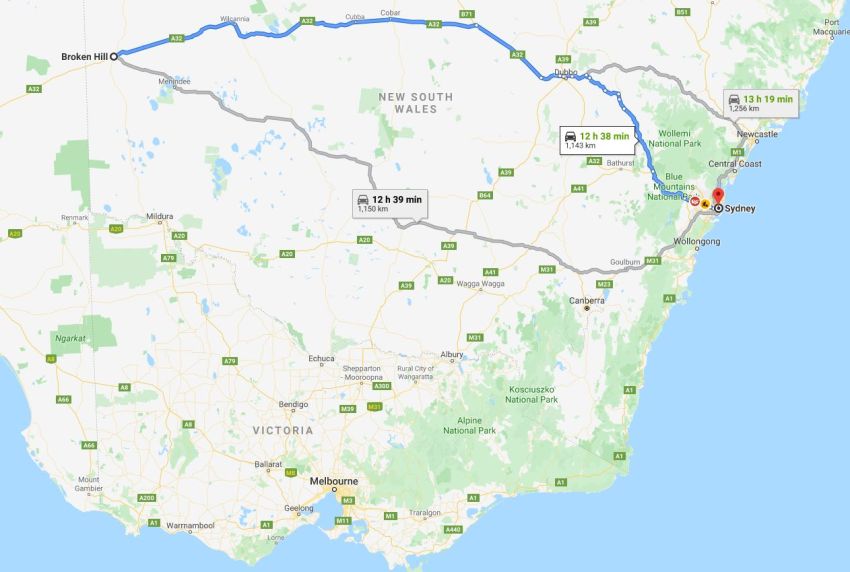
Well-documented corruption on a huge scale has dried out the Murray-Darling river system. Aboriginal communities along the river and its tributaries are calling it genocide. From September 28 to October 4, Aboriginal activist Bruce Shillingsworth helped those communities hold the Yaama Ngunna Baaka Corroboree Festival to educate the world about the crisis. Two buses left from Sydney to follow the festival. Green Left Weekly's Mat Ward, who took his nine-year-old son on the second bus, gives a blow-by-blow account of the trip.
Day 5: Menindee Lakes to Sydney
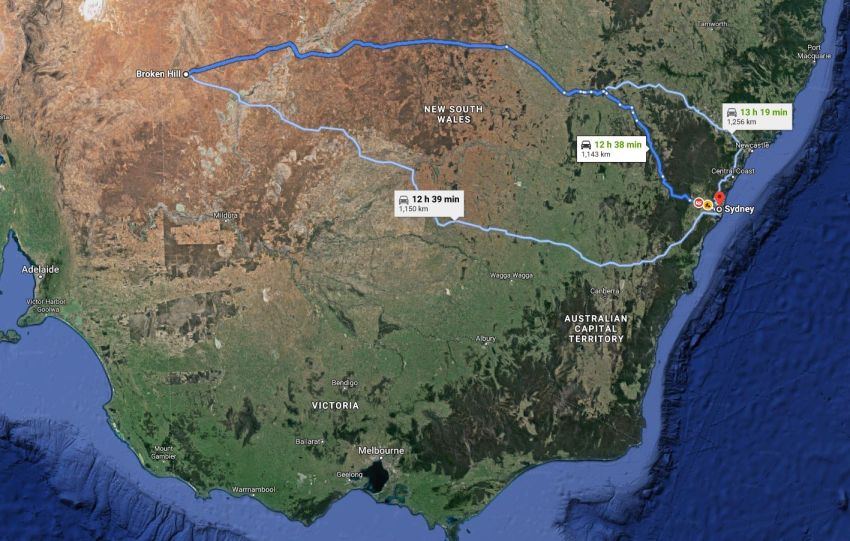
[Google maps won't let you calculate a route from Lake Menindee to Sydney. It seems that such a route blows Google's mind, so I settled for the closest town, Broken Hill. Try it and see if you have any luck.]
4.20am There's only one toilet on this campsite
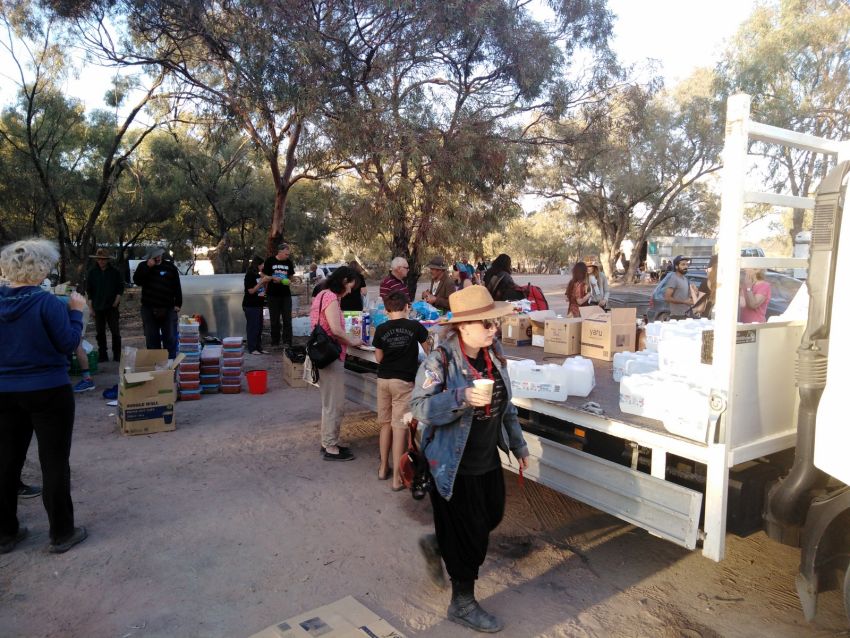
I awake in complete darkness and decide 4.20am is as good a time as any to fight for the campsite's only men's toilet. There's no moonlight - only a blanket of starlight - so I walk in a huge circle for 10 minutes, squinting and searching for the toilet block. It turns out to be right next to our tent.
There was a long queue for the women's sole toilet last night, but now the whole block's deserted. In the dark, I can't find the toilet door's lock, so I hold the door shut with my foot, balancing precariously.
We have to get our bags on the bus by 7am, so I rush to pack up all our stuff, including our plates and utensils, and throw them in the bus baggage hold. Surprisingly, breakfast is then served from the back of the food truck.
6.50am We try to stuff ourselves with the breakfast food that contains the most sugar
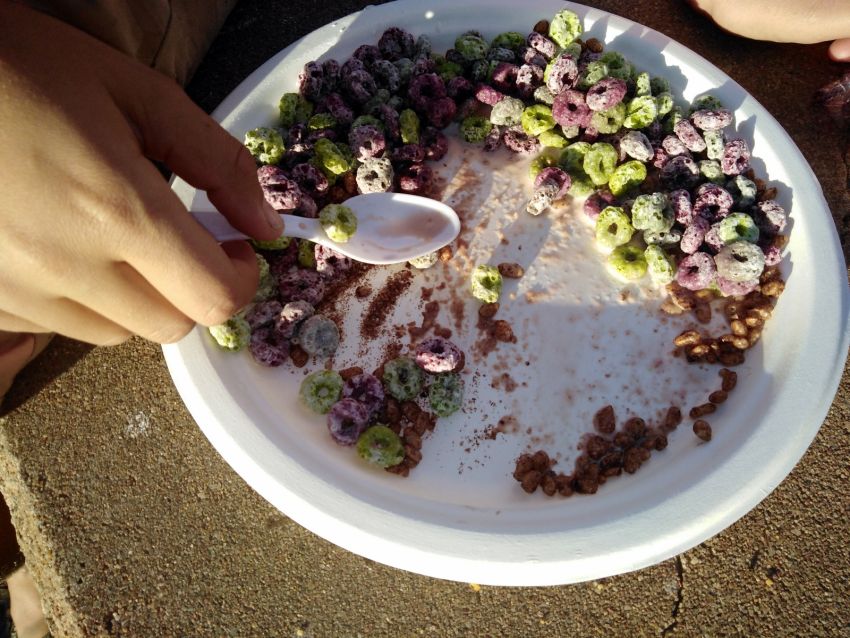
It's going to be a long bus journey - up to 20 hours - with not many toilet stops. Therefore, we opt for the cereal that looks like it contains the most energy in the least volume - some fluorescent-looking Froot Loops. Our cutlery's in the baggage hold, so we wolf down the cereal and milk off a paper plate as fast as we can before the plate disintegrates.
We feel guilty about using plastic spoons, so wash them for re-use.
6.55am Time for an ironic photo
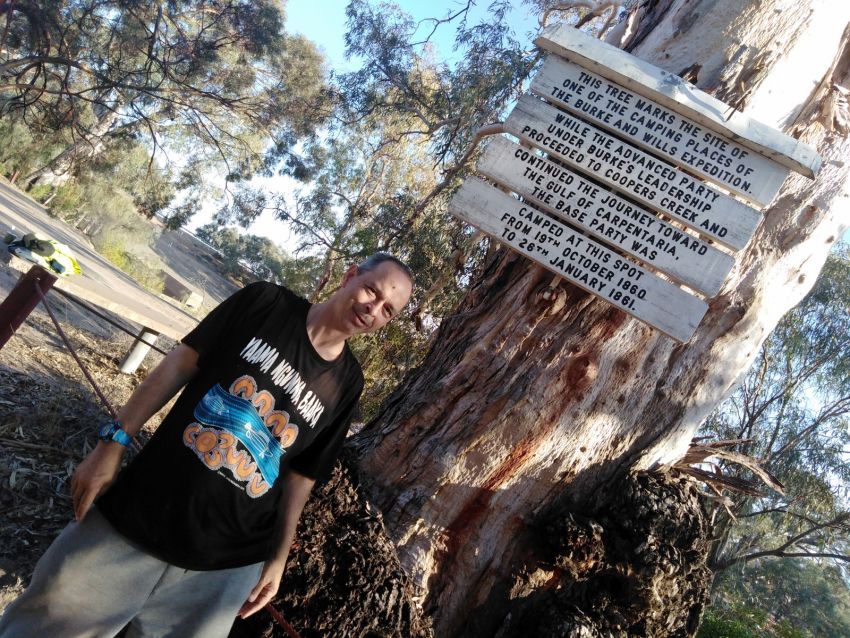
Tony, a gregarious Kamileroi man who has been taking photos throughout the journey, has probably chatted with everyone on the trip. I grab him and ask if he's up for an ironic photo next to the sign commemorating the fact that the white "pioneers" Burke and Wills camped at this spot. "Sure," he laughs.
Posing for the photo, he says: "I've just moved from Victoria to Kingsford near La Perouse in Sydney to be closer to the mob. Family is the reason I came on the trip. I was born in Moree so I've got relations in most of the area. I also came for culture."
7.15am 'I'm finding my identity'
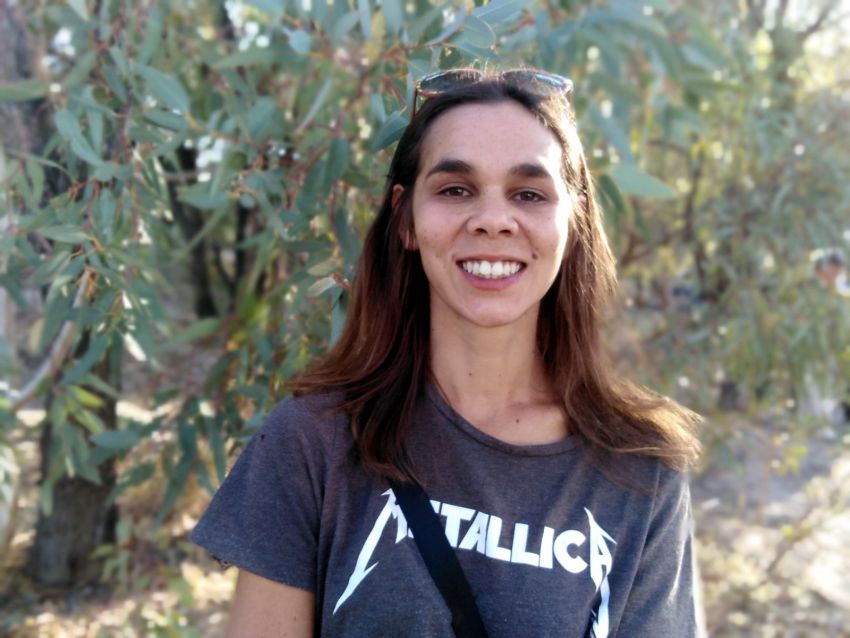
As everybody waits to board the bus, I spot Corey Kirk, a stylish young Aboriginal woman who I've previously seen playing her guitar in the shade. I've been meaning to speak to her, but she's now switching from bus two to bus one for the journey home, so this is my last chance. I ask her for a quick chat under a gum tree.
"I'm from Sydney's northern beaches," she says. "I came on the trip to listen to the people from the grassroots and also to help with my journey and finding my identity - for my father, too, because he was adopted. He was on the cusp of the stolen generation, because he was adopted in 1970 just after the referendum. He was adopted at three months, in Tamworth.
"This journey has helped because I've spoken to many people in the same situation, trying to find their identity.
"It's been lovely to hear from the people who are suffering the most, to take away some of the pressure and listen to them. I've heard from mums wanting to take their own lives."
Her bus is leaving so, sadly, she has to depart.
7.52am 'So, where did you get the name Gay Egg?'
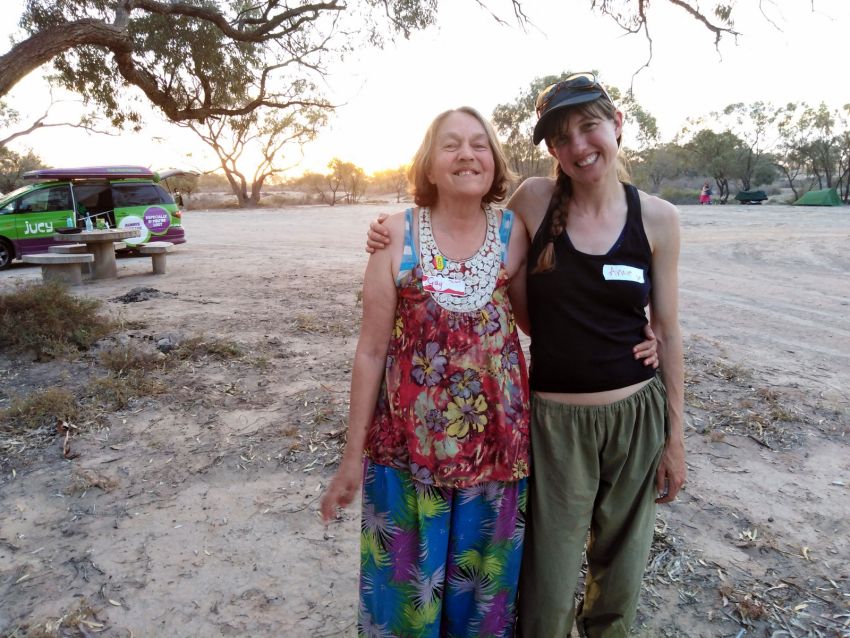
My nine-year-old son likes meeting new people - I don't know where he gets it from. So, while he talks with people at the back of the bus, I'm joined by a procession of people who sit in the seat next to me after each stop. For the start of the journey home, I'm joined by long-time activist Gay Egg (above, left, with fellow traveller Amie).
Gay Egg was on the first bus, but has swapped to the second bus for the return journey. I ask where she's from.
"I was born in Murihiku at the bottom of Te Waioupnamu, which is the South Island of Aeotearoa," she says, using the Maori name for New Zealand. "I came over to Australia in 1974."
"So," I ask, "where did you get the name Gay Egg?"
"I was part of the women's liberation movement in the 1970s," she says. "Our women's refuge in Glebe, Elsie's, managed to get the most money from [the Prime Minister's wife] Margaret Whitlam, because we had the biggest mouths. One of the founders of Elsie's in 1974 was called Mez Egg.
"One day, Gwen Egg came up from Hobart women's refuge on a job swap. We were going up to Brisbane to take thousands of dollars up there for the refuge, but also for the International Women's Day march in 1976, so we could have been arrested. We used to take money up to the Brisbane women's refuge because [state Premier] Joh Bjelke-Petersen had banned protests in Queensland and refused to fund women's services.
"So Gwen asked me: 'Do your family approve of what you do?' I said: 'No.' So she said: 'Do you want to be an Egg?' I said: 'Why Egg?' She said it was the most female name they could come up with. There were at least seven of them at that stage. It was like: 'Fuck the patriarchy.'
"They all deed polled their names because in those days you could deed poll your name so cheaply. People used to change their names, like, every year."
8.20am This pipeline is long
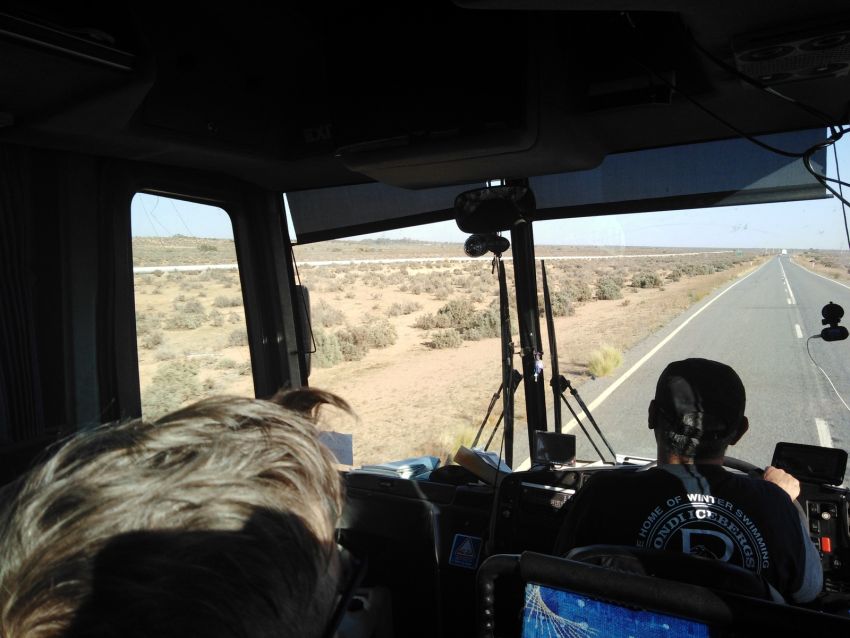
We begin to drive alongside the pipeline that brings water from the Murray River to Broken Hill, which ensures water supplies for two new mines in the area, since the Menindee Lakes have been dried out. The $500 million pipeline is 270 kilometres long.
I ask Gay Egg what brought her to the Corroboree festival.
"I came on the trip because Bruce Shillingsworth said the Indigenous people of the towns along the Baaka needed our help and because I knew about the work that Water for the Rivers was already doing," she says.
"When I went to the Shillingsworth art exhibition at Mosman art gallery what I learnt from him shocked me so much that I just started crying and I didn't stop. I was crying for weeks because the environmental ruthlessness of economic rationalism these days makes the stuff that happened in the 1970s look like child's play.
"On bus one, there's a Jewish Murray-Darling scientist who was talking about the 1500 farmers who are protesting against [water minister] David Littleproud - they threw an effigy of Littleproud into the river. But he says their PR teams are spinning them as poor farmers, yet they are big agribusiness and greedy for water. They have been hanging a noose from a tree, which is so offensive to Indigenous people."
9.36am 'Not enough people explore rural Australia'
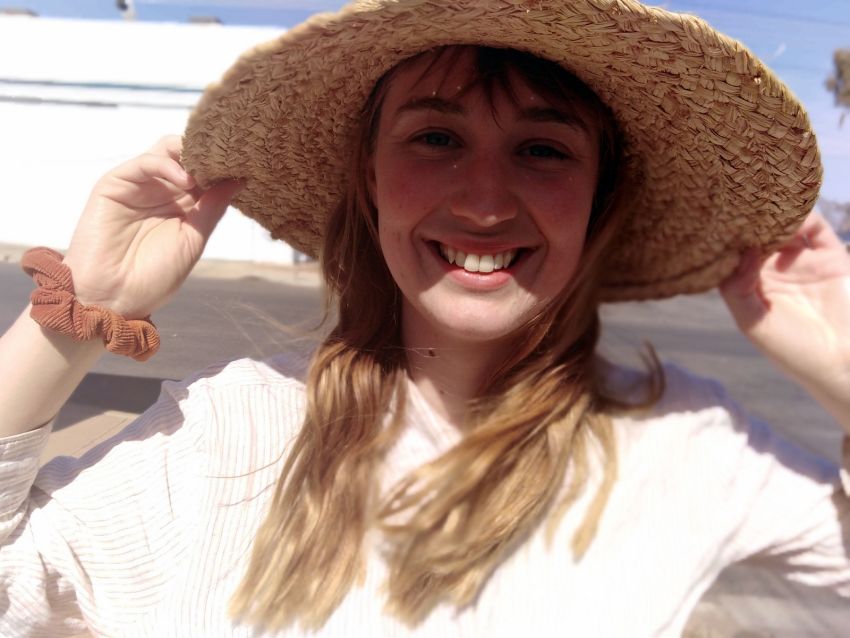
We stop at Broken Hill Caltex for fuel. As the thick, dry, desert heat swirls around us, I get chatting to Roisin Concannon, who's told me she reads Green Left Weekly.
"I grew up in Austinmer in Wollongong with two mums," she says. "It's a big Christian area so we were surrounded by a lot of evangelical Christians. Same-sex couples weren't as accepted then as perhaps they are now.
"However, we were also surrounded by a lot of artists as well, and had a lot of strong aunties in the community who didn't have kids.
"I came on this trip because I wanted to do something that was a bit similar last year. I think not enough people explore rural Australia other than grey nomads. Young people aren't learning about Australia.
"I did an earth hour event for the water crisis in Walgett and that really made me think how much I didn't know what was actually happening on the ground.
"I want to be part of communities - and just to be so connected was something I really learnt on this trip. I've always had an interest in helping Indigenous people any way I can. I studied Indigenous land management as part of my agricultural science degree. I have a big passion for the environment and that's why I chose to study agricultural science. The way we produce food has a big impact on the environment, so that's why I had a big interest in this trip.
"Small scale farms are the answer, I think."
10.10am Bus one isn't having much luck
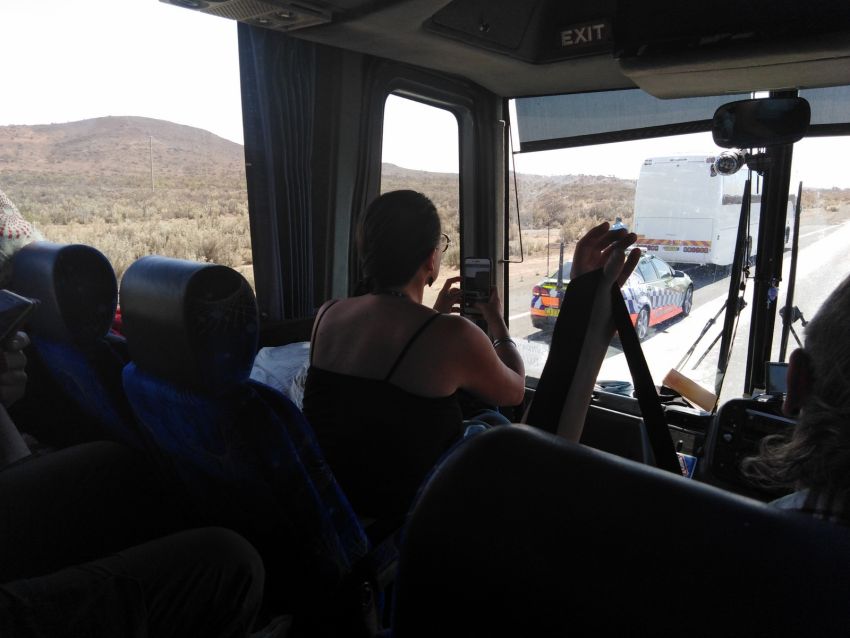
As we pull out of Broken Hill, the first bus gets pulled over by the police, possibly for speeding. The driver isn't having much luck. It'll be the second time he's been pulled over this trip.
"The weigh bridge outside Hartley was a set-up though," says Gay Egg. "The number on the digital sign changed as we went past. Other bigger vehicles went past. The buses film the road ahead all the time, so he has it all on camera."
The passengers on bus one haven't had much luck either. "There was supposed to be a toilet and air conditioning on the bus, but there's neither," says Gay Egg. "We had a mental health crisis on that bus, some people were feeling excluded from the group. The lack of air conditioning didn't help."
But there were some perks for bus one. Gay Egg tells me that Waradah Aboriginal Centre's senior dancer Peter Williams and his daughters took bus one to Four Mile reserve near Brewarrina. "He told them the spiritual stories of the place at a children's level, then they all jumped from the jetty."
10.12am 'The water theft is resulting in one of the worst tragedies, which is youth suicide'
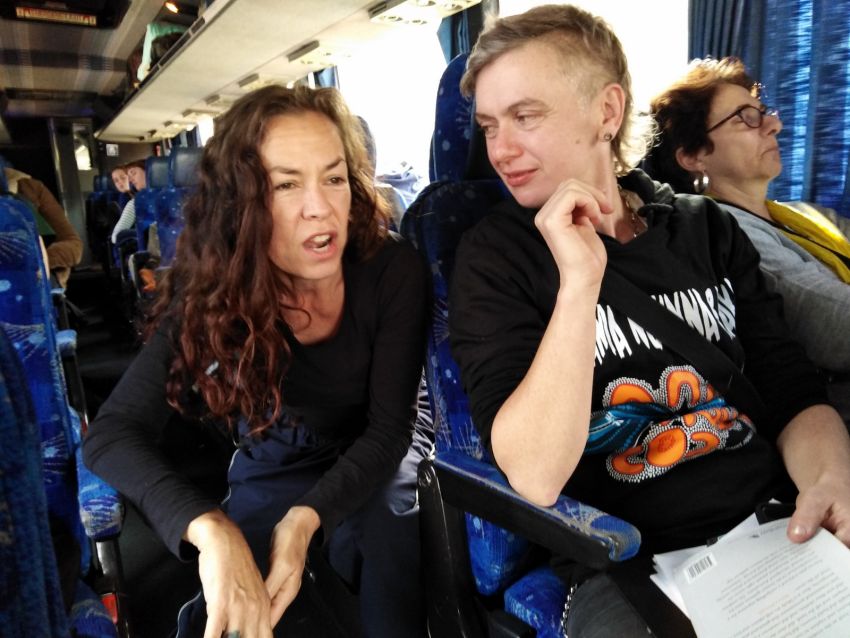
I'm joined for an hour by a woman who tells me she's on the trip to come to terms with what her family has done. "They supplied a lot of the pumps the irrigators use," she says. Understandably, she doesn't want to be in this blog. At Wilcannia, she sat for a long time under a tree, she tells me. "It's a lot to process."
Her words hit home when I'm joined by a passionate and fun woman from the trip (pictured above left, with organiser Rachel Evans), who says she wants to be known as "smallAxe Pash" for the blog. She says she's from Terrigal, on the Central Coast north of Sydney. When I ask why she came on the trip, she becomes serious and eloquent.
"My interest ignited out of my concern for the impact of water theft from the cotton farmers in Murri country that has been enabled by our self-serving colonial programmed government," she says.
"I'm deeply distressed about the damage that has been realised by these ecocidal and genocidal policies that have been practised since Prime Minister Howard privatised water and made it a commodity to sell from 2004. It is sorely evident that the lives of humans, flora and fauna have been profoundly impacted in such a negative way that we are facing the tragedies of these dried up rivers, animals and humans both.
"The water theft is resulting in one of the worst tragedies, which is youth suicide.
"I cannot see how we can ignore for one minute longer without addressing our capacity to protect the health of our children, our environment and all the other species that we share our life with. These statistics are too alarming to ignore and all the distraction tools that have been employed should not stop us from acting in our capacity on these issues."
12.20pm How much of each taxpayer's money is being spent wrecking the river?
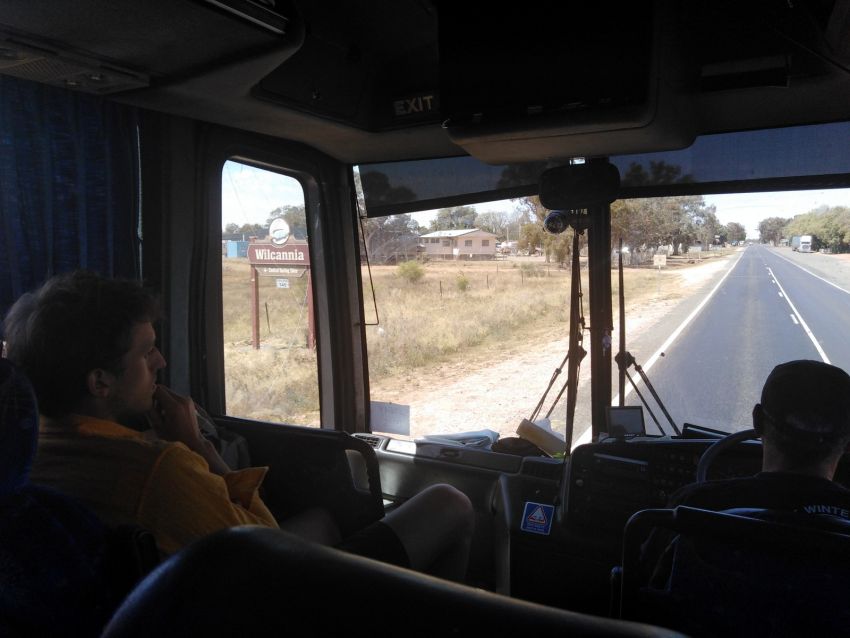
As we pull into in Wilcannia, once slammed as "the worst town in Australia", Rachel Evans is trying to come up with tour statistics. "In their advice on writing our press release, SBS were saying we should say how many oranges were eaten on the tour and so on," she says. "So, 600 people were fed in Bourke, what else?"
"Ummmm," I say, "how about how much money each taxpayer is paying for the failed Murray-Darling Basin plan that was supposed to protect the environment but is instead helping big irrigators send the money out of the country?"
"Yeah," she says.
I look it up. The latest available figures, for the financial year 2015-16, say there are 13.5 million individual taxpayers in Australia. The ABC reported that $13 billion has been wasted on the plan. So, if there are about 13 million individual taxpayers in Australia, that's roughly $1000 per taxpayer that's being spent wrecking Australia's environment and helping the big irrigators send profits overseas.
12.25pm That's enough to buy 166 bottles of $6 water in Wilcannia
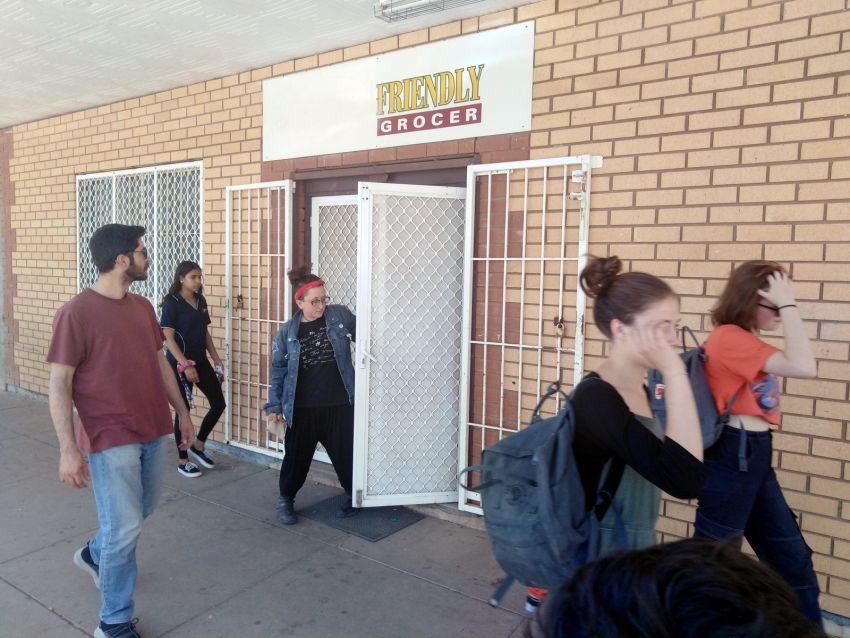
We pile out at Wilcannia and pile into the Friendly Grocer, which has unfriendly bars on the windows to stop people breaking in. An Aboriginal girl is serving on the checkout. The locals have told us one guy owns three of the shops in town and charges $6 for a bottle of water.
Driver George is letting bus two's overheating engine cool down as he waits for bus one to show up.
I take the opportunity ask him what happened after the police pulled over bus one in Bourke.
"$360 fine, he was booked," he says, resignedly.
1.35pm The bus isn't the only thing overheating
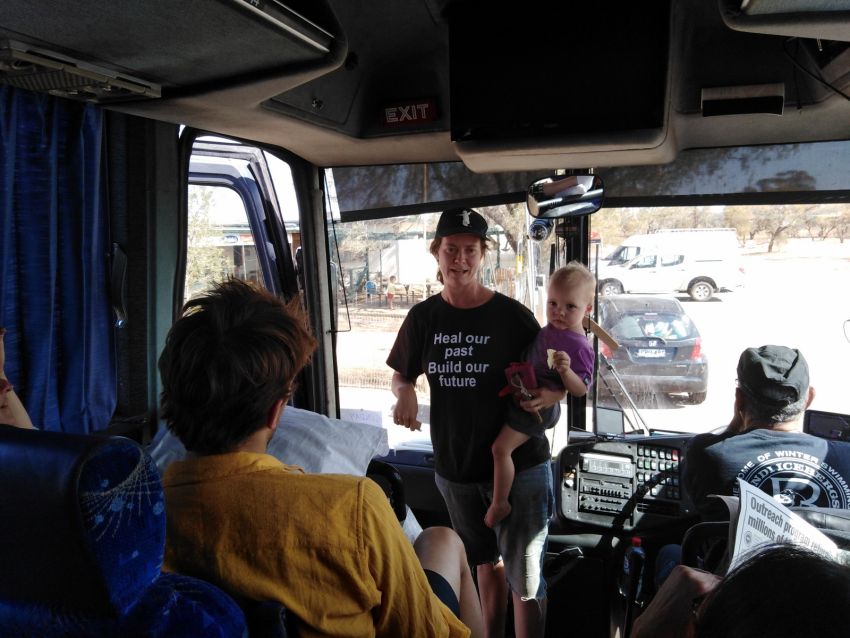
Roisin, who we spoke to earlier, asks if anyone has some loose-fitting clothes she can wear as she's overheating. So is the bus. Driver George pulls over and goes to the back of the bus to open the engine cover and "take the radiator cap off" to cool things down.
"The dirt road didn't help," he says. "Hopefully that will relieve some of the pressure." He gets on the phone. "I'm not going to ignore the temperature gauge, it's 35 degrees outside," he's saying. "I'm sitting between 70 and 80 kilometres an hour."
Suddenly Roisin gets very sick and we have to pull over. A cloud of flies enters the bus as Roisin exits.
"There's a load of roadkill out there, full of flies," says someone. George is trying to swat the flies, but they won't die. It seems they are hard, outback flies. We make a U-turn and pull into a roadhouse opposite.
Ruth Nelson from the car convoy, who is driving with her two young kids, enters the bus (pictured). "It's good to see you," she says. "We ran out of petrol. We had just 12 kilometers left and I was thinking, well, we've got food, water, and someone will soon pass through. Luckily this roadhouse came up."
3.40pm This Aboriginal woman got extremely sick after swimming in the river
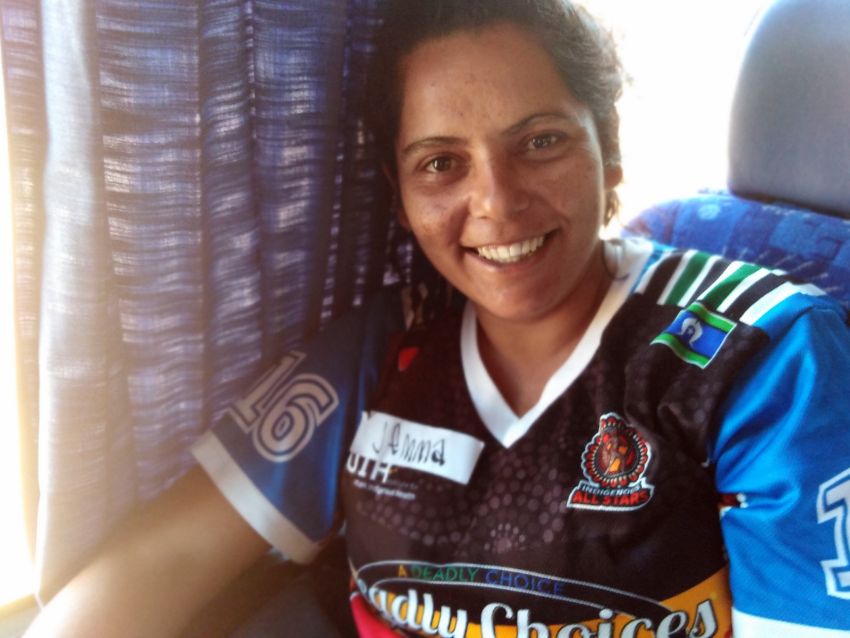
Back in Bourke, when I asked young Dunghutti woman Jemma how the trip went for her, she startled me when she replied: "I vomited this morning." I'd been in the middle of chatting to Roisin at the time, but now I ask Jemma, who lives south of Sydney, for the full story.
"Dunghutti is my nation, but I live in the Dharawal area, in Miranda," she says. "I came on the trip because I wanted to see the devastation of nature. Culturally, there's a lot of people suffering that are our mob, too."
I ask how she got sick.
"At the first bridge above the concrete weir at Brewarrina, these two guys were swimming," she says. "They got in just before us and said come in. We didn't know the water was contaminated. We got in, but got sick. It was refreshing at the time but then I realised very quickly that something wasn't right. It was like mercury, like a hot feeling, like being close to the sun. I thought I'd give myself a facial. I rubbed the sand in my face. It burnt my eyes. I drank a mouthful and my mouth went really dry and my tongue was like a piece of sandpaper. It was full on. It was scary. It started freaking me out and I wanted to get out.
"I said: 'We should have had permission from the locals before we did that.' Afterwards, the locals said: 'Don't go in that water, you'll get boils and scratch your skin off.' I broke out in pimples over about eight hours. I had a shower with bore water that night and I got so itchy. I woke up and I had a rash down both sides of my legs. I felt like I could scratch my skin off. I've heard the nurses in Bourke saying they deal with a lot of boils and skin allergies and hives."
I ask if there were any warning signs by the river.
"No," she says. But, stoically, she smiles.
"It's been a great trip, though, apart from having to moisturise constantly and the constant itching."
4.04pm 'What the fuck are a bunch of Christians coming through here for?'
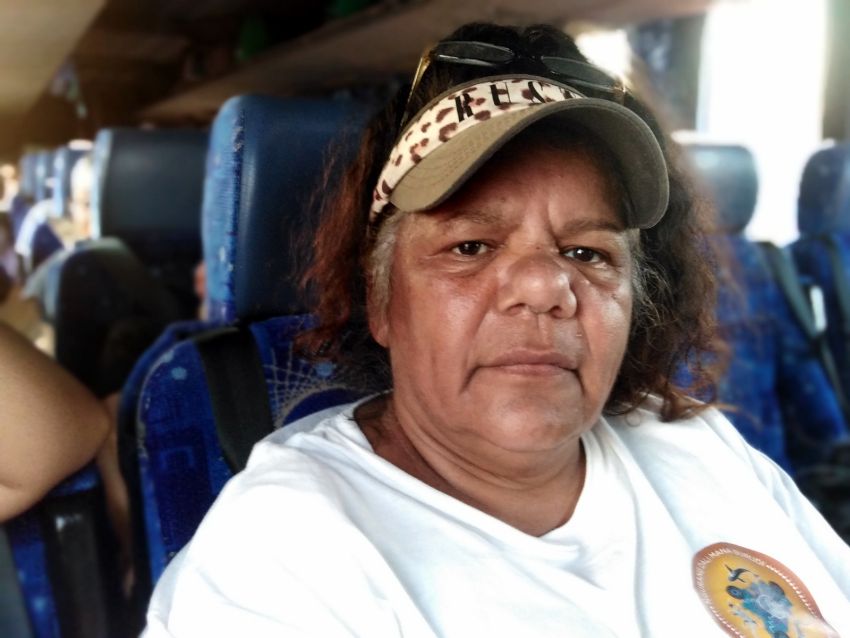
I ask Jemma's mum, Dolly - who's sitting with her - if she'd like to talk about the trip. She agrees warmly.
"I live in the Dharawal area at the moment, in the Sutherland Shire, ScoMo country," she smirks, referring to Australian Prime Minister Scott Morrison by his nickname. The area hit headlines worldwide for the Cronulla race riot in 2005.
"I'm an Aboriginal woman," she continues. "It's important that you write that. When I was in Bourke I met an Aboriginal woman down by the river and was excited to speak to someone local who was mob. But she was very angry. She said: 'What the fuck are a bunch of Christians coming through here for? They won't change anything.'
"I said: 'They're not Christians. They're coming through to learn about the river.' And she said: 'What the fuck would you know as Christians?' She wasn't convinced.
"I was angry when the local politicians got up at the Corroboree in Bourke, big-noting themselves. I was going to go up and have a go at them, but someone held me back."
I ask her what the best past of the trip was.
"My favourite part was being with people from all walks of life who are so passionate and wanting to see change," she says.
4.20pm It seems some Cobar locals don't like Green Left Weekly much
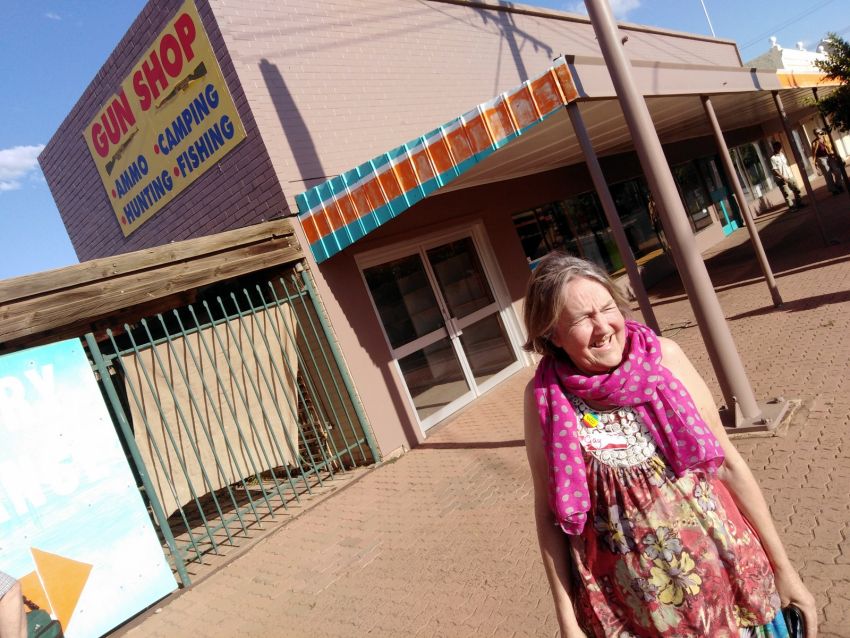
We stop in the mining town of Cobar for a break, so I walk along to the gun shop in the hope of getting an ironic photo of pacifist activist Gay Egg as she walks past. As she approaches, a local says in my ear: "What are all you lot on that bus doing here?"
"Hang on," I say, "I've just gotta get this pic."
As I make him wait, I realise I'm wearing a T-shirt by Aboriginal artist Vernon Ah Kee. "Australia," it says in big letters. "Drive it like you stole it." I wonder if he's about to punch me.
I take the photo of Gay Egg (above) and turn to face him. He's wearing fluoro work gear, mirrored wrap-around shades and is sucking hard on a cigarette.
"Erm," I say, "we're here on a tour of all the river towns that have been hit hard by the water crisis. We've come to learn about from the people who are directly affected by it, on the ground."
"Right," he says.
"So," I say, "what would you do... to solve the crisis?"
"Well," he says, "what they've gotta do is drill through the Great Dividing Range and bring the water from the other side of there over here, that's what they've gotta do."
"Yeah? Well, I tell you what, I'm writing a blog of the whole trip for an environmental activist newspaper called Green Left Weekly..."
"Oh yeah?"
"... and it'd be great to get a few words from you for the blog, if you're up for that?"
"NO," he says firmly, looking off into the distance and with a dismissive wave of his hand. "But get that in about the Great Dividing Range."
"OK," I say.
And he walks off.
4.50pm There's a house in Cobar with two pet wallabies in the garden
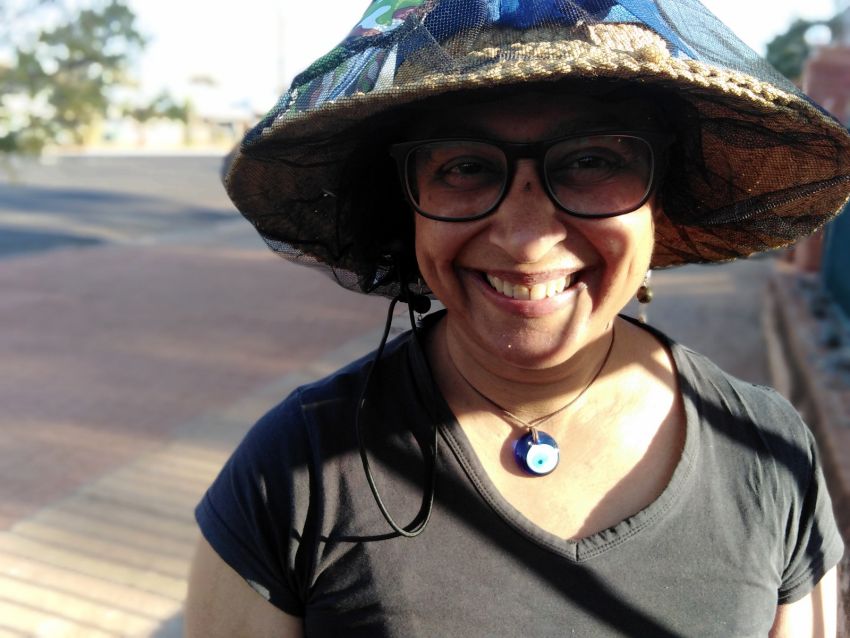
Our driver, George, tells me to take my son over to the house across the road from the bus. "There's wallabies in there," he says, pointing.
We walk over. There's a huge trampoline in the garden with two small, brown and grey marsupials next to it. They look back at us, blinking through the late afternoon haze. "Aw, look," I say to my son. "They've given them a trampoline because they like bouncing." I raise my mobile phone to take a photo, but as soon as I do so, they hop off to the far side of the garden, impossible to shoot.
I turn to the woman next to us, who has been Instagramming the whole trip, and ask her if she fancies having a quick chat for the blog.
"Sure," she says. "I'm from Annandale in Sydney. My name's Marghanita da Cruz. I'm a Greens councillor on Inner West Council.
"I came on the trip because it's an opportunity of a lifetime and a chance to experience the Aboriginal culture out here. I met Bruce Shillingsworth at the Fix New South Wales rally and got excited by the art exhibition he put on at Mosman.
"I've thought about doing something like this often and an opportunity like this really doesn't come up. I hadn't been to this area before, so that's just been amazing - as well as all the culture, the dancing and Corroborees.
"So I really thank Uncle Bruce for the opportunity - and we're willing to help in any way we can going forward."
5.20pm We drop three people off at emergency
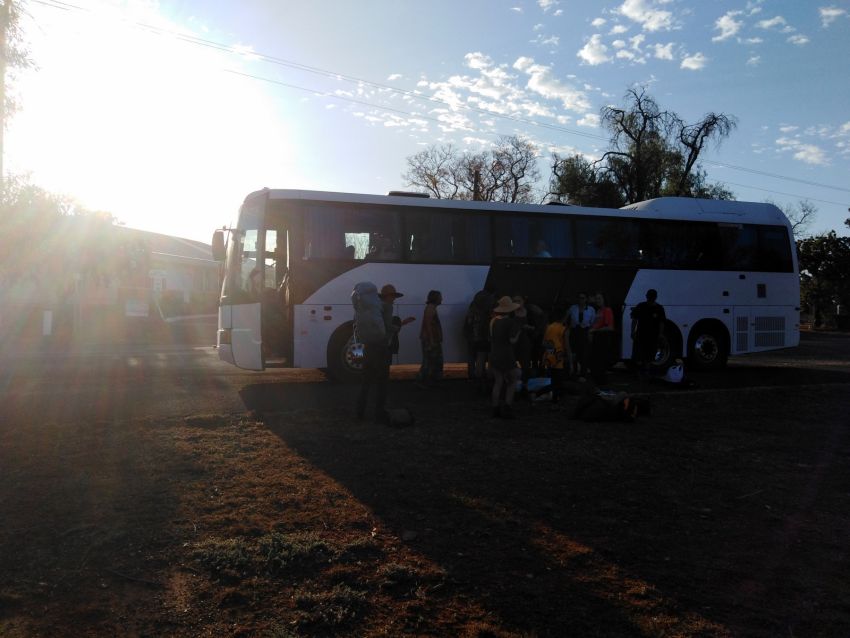
It seems the doctor on our trip, GP and Ayurvedic medicine specialist Shaun Matthews, has assessed Roisin and decided she needs medical attention. As George pulls up at Cobar hospital, organiser Rachel Evans announces that we're dropping off the doctor with Roisin and Gryffyn at the emergency department.
"They are going to stay here tonight on the bus trip emergency fund and get the train back to Sydney tomorrow if needs be," she says. "We had money in the kitty for any emergencies, so it's all good."
We wish Roisin luck.
5.32pm The Koori Mail has requested photos from the tour
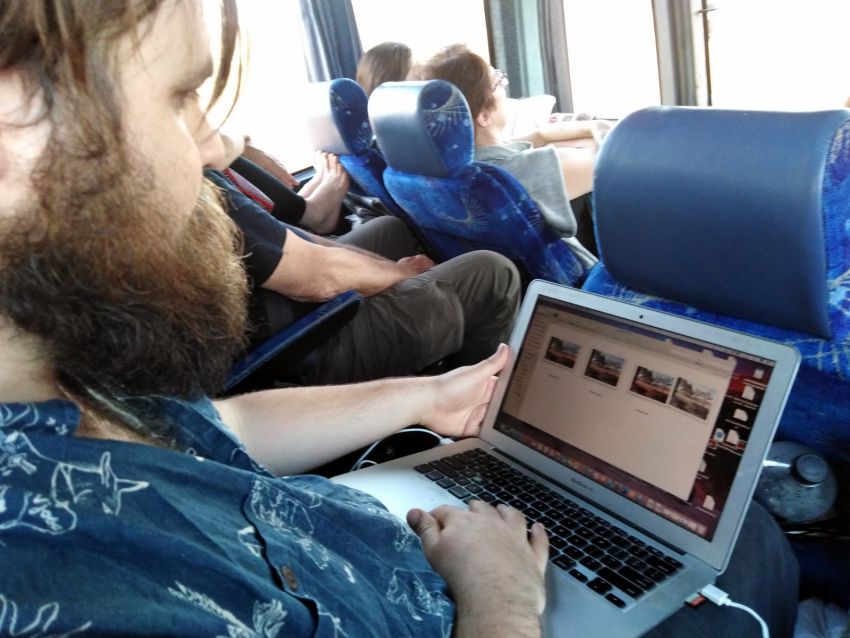
As we leave Cobar, Green Left Weekly's award-winning film-maker and photographer Zebedee Parkes sits next to me as he needs a power outlet at the front of the bus for a laptop. National Indigenous newspaper The Koori Mail has requested photos from the tour.
"Luckily I always take low-res jpegs along with the raw files," he says. "Therefore I can just upload them quickly for people that want them over the web or if I've been to a rally I can just upload them fast and go to the pub. It allows me to actually have a social life instead of spending 10 hours uploading hi-res files like I used to."
So, is Zebedee his real name?
"Yes," he says. "It could either be a pop culture reference or a Bible reference, but it won't be a Bible reference as my dad was an atheist."
Zebedee from The Magic Roundabout then?
"Yeah, probably, as he watched a lot of films and listened to a lot of music. It actually works quite well as a photographer - you know how people work really hard on branding?"
6.05pm No wonder so many kangaroos become roadkill
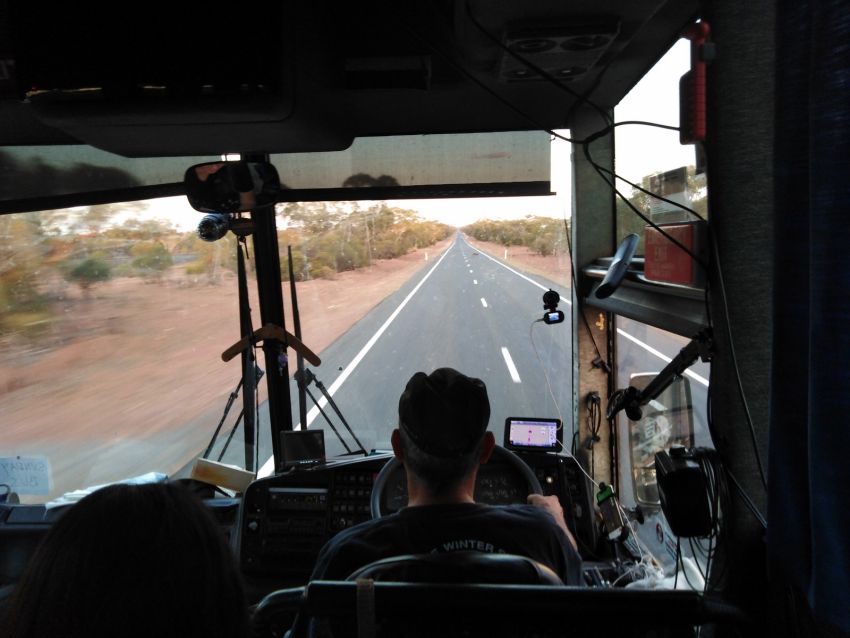
George has to beep the horn repeatedly to get this kangaroo to hop off the road. For a moment it looks like a pending accident. The sun is setting so it's hard to get a good photo on my mobile.
6.42pm Darkness has fallen
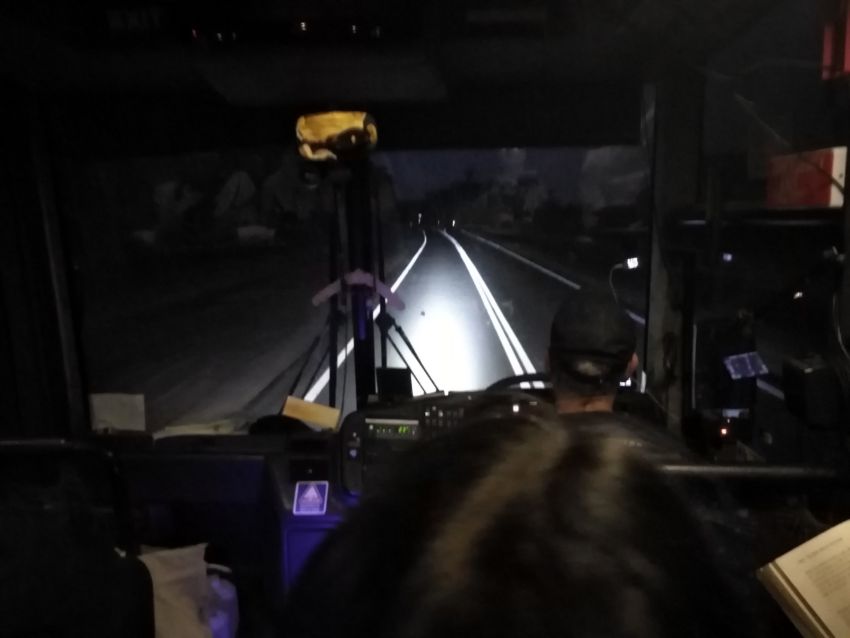
As Tatjana, from Germany, passes round a hat for our driver, George, activist journalist Tracey Carpenter asks him how many kilometres he will have driven by the end of this trip. "At the end of this trip? 2500 kilometres," he says.
Another passenger asks him if he should be stopping every two hours for a 10-minute break, by law.
"By law it's 15 minutes every five hours," he says. "But if I feel tired I will stop no matter what. Please do not wake again to ask me that question. I was having a good dream."
7.00pm You can visit a shearing shed in Nyngan...
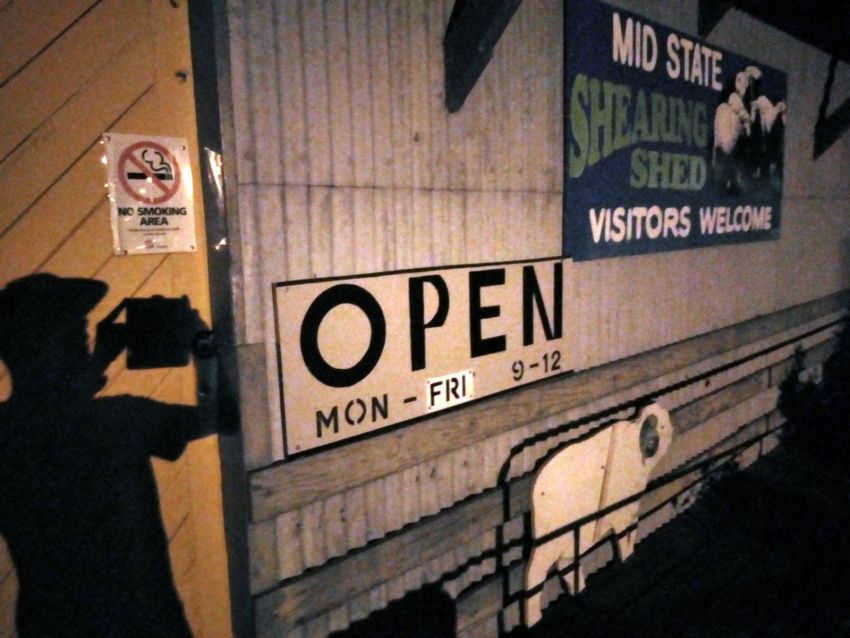
We make a toilet stop next to a shearing shed in Nyngan that looks like it's been built for grey nomads. There are lots of campers parked around here.
7.02pm ... but our group seems more interested in the Dump-Ezy
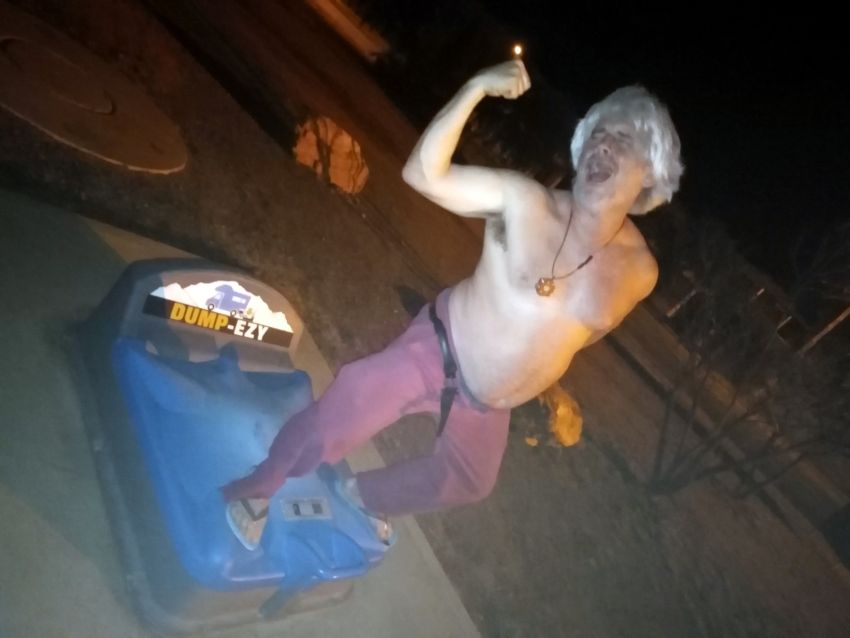
As our group queues for the toilets, Tony Polson, a born exhibitionist, whips off his shirt and mimes taking a dump at the chemical toilet dumping station.
7.23pm A speech for a legendary driver
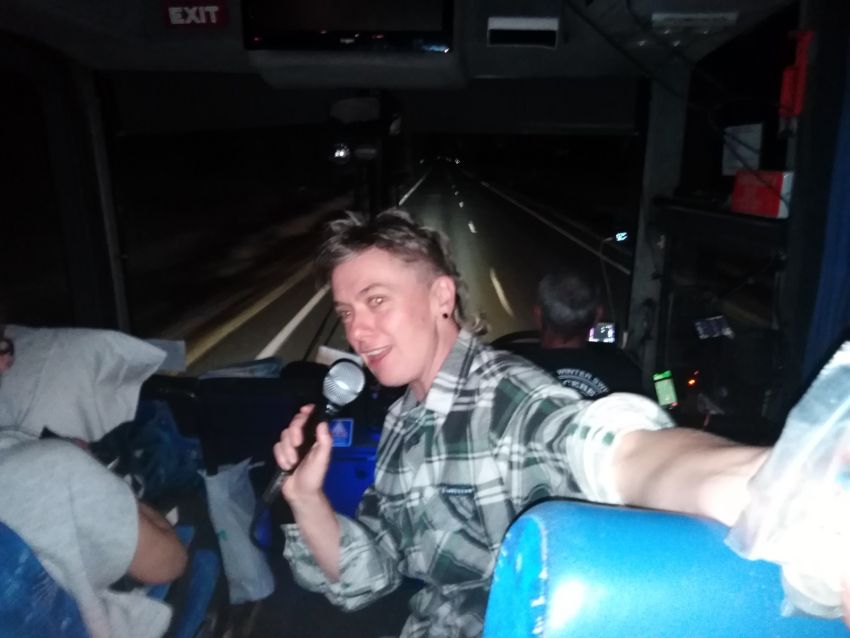
Organiser Rachel Evans takes the microphone to present George with the whip-round.
"He's put up with shitty toilets, bad directions, and really stood up for us against the owner of the bus company to get us the deal we paid for and get us home safely," she says.
She asks if anyone else has any announcements. I take the microphone and ask people to approach me if they have anything they'd particularly like to be in the blog. "If you've heard any particularly interesting stories, or taken a particularly good photo, let me know."
Gill Boehringer, a Research Fellow at Macquarie University Law School, comes and shakes my hand. He says he attended the public hearings for the Citizens’ Inquiry into the Health of the Darling River and Menindee Lakes in March. "What the Citizen's Inquiry heard about the river remains the same, in the view of the locals we talked to on the river this time," he says. "If anything, conditions seem to have deteriorated."
He sends me his notes from the public hearings. Here is a selection of quotes and the locations from where they were taken:
- “How have they chosen cotton over life?” - Wilcannia
- “Aboriginal communities are feeling helpless and hopeless... Non-Aboriginal communities feel the same thing.” - Mildura
- “In the summer in which the pipeline was made there were 30 suicides over the summer, many of them in the Aboriginal community.” - Mildura
- “One way to get rid of someone is to take away their lifeline... our lifeline is the Darling River.” - Menindee
- “What is the real reason for no water? They want our land, they want to get rid of the little towns. Once they get rid of the people and towns, they want our land.” - Bourke
- "Fourteen members of our family have died from cancer, still not sure if it’s from drinking water from the river.” - Wentworth
- “I’ve known lots of people, just as an employment agent, who have killed themselves.” - Broken Hill
- “I had my kids baptised in the river. I wouldn’t let me dogs in there now." - Broken Hill
- “The media is pro-cotton here, we don’t get independent information. The newspaper and radio station are owned by one family, although there is another station.” - Bourke
- “Two of my dogs drank river water and died.” - Menindee
- “The cotton farmers coming was the start of the end.” - Menindee
9.03pm There's a feature about the tour on National Indigenous Television
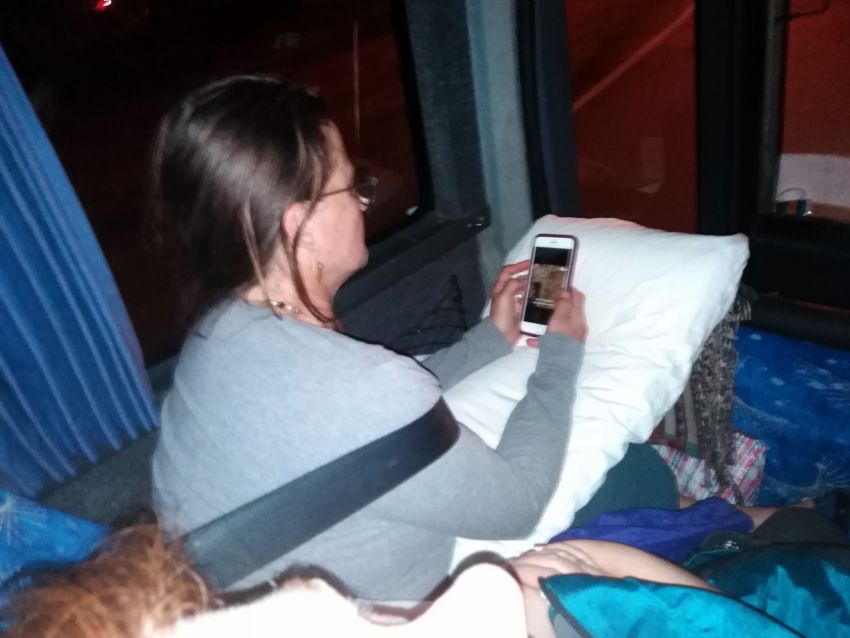
As we roll into Dubbo, activist and journalist Tracey Carpenter watches a clip of Bruce Shillingsworth and the Water for Rivers campaign on NITV.
9.21pm 'The greatest four days of my life'
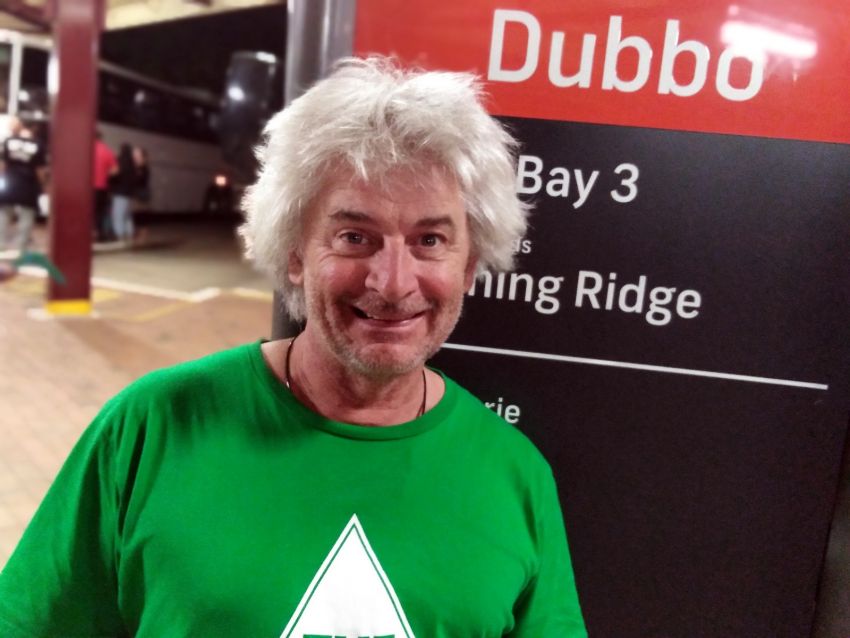
At Dubbo's bus and train station, we change drivers. George's partner, Rachel, takes the wheel. George collapses, exhausted, across the front seats.
Before we get back on the bus, I grab a chat with Tony Polson, the exhibitionist and clown who had half the audience in stitches when he beatboxed with rapper Dobby in Wilcannia. Unsurprisingly, he's used to performing. He says he's a musician, audio engineer and audio tech designer who runs his own guitar pedal company, Thunderfoot Pedals, in Gladesville, Sydney. I ask him why he came on the trip.
"I cycle every day and I'm very keen on alternative energy," he says. "I'm very keen on hydrogen energy and hydrogen healing. I'd never been past Lithgow my whole life and I'm in my mid 50s. I'd seen enough on TV to really alarm me, particularly the fish kills.
"I now realise that I've finally seen a part of the 'real' Australia. I passionately want the inland river communities to not only survive but also thrive. In that way we're keeping the 'real' Australia alive. I just loved seeing that new hair salon in Wilcannia.
"It's really getting up there with the greatest four days of my life. I learnt so much about Indigenous stuff. One of those highlights for me was Aboriginal astronomy. I experienced that while looking at the stars at night in Bourke with Peter Williams.
"I feel so honoured that these Indigenous legends so freely shared their incredible ancient wisdom with me, even after the shameful things my forebears have done."
10.41pm 'Would you like lies with that?'
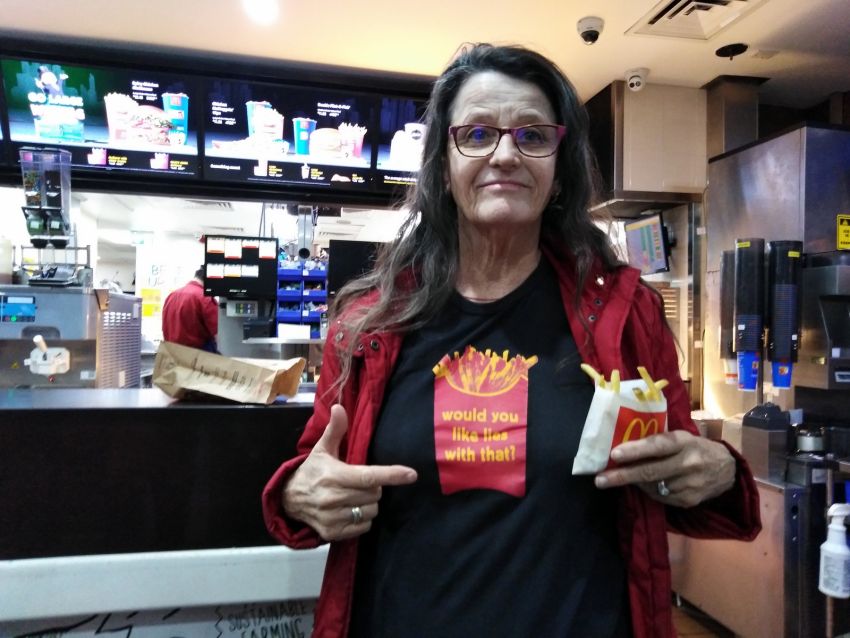
There was no stop for dinner and everyone's way past hungry, but nothing's open. Our new driver, Rachel, suggests we pull up at the first food outlet with the lights still on. We all agree. It turns out to be McDonald's in Wellington.
Thankfully, there's one activist keeping up our credibility. McDonald's Wellington serves up the perfect pose for Abi George, who happens to be wearing her "Would you like lies with that?" T-shirt.
10.50pm Appropriately enough, this is the news they serve up with your meal
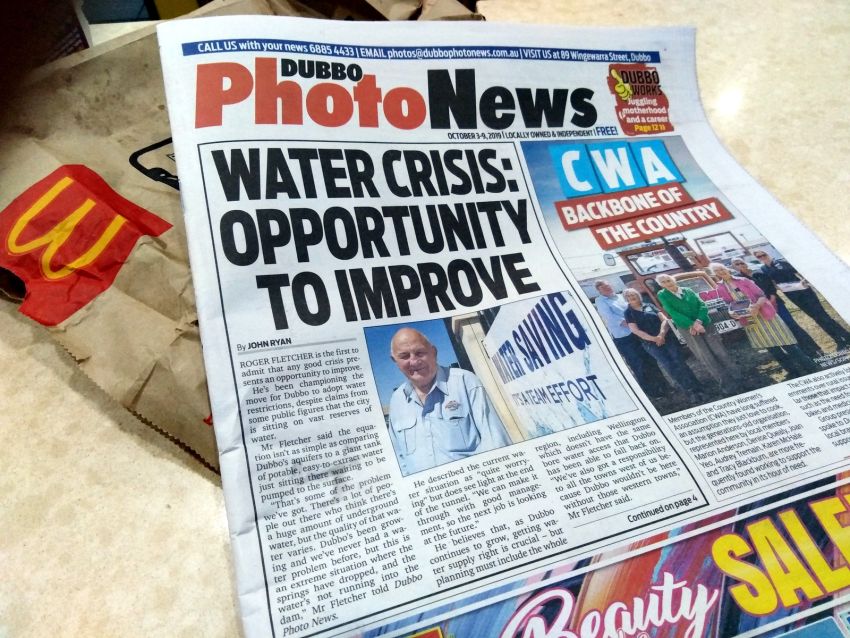
It seems the locals in the Citizen's Inquiry weren't kidding when they said the local media are pro-cotton.
A minute after we leave McDonald's at 10.59pm, it, too, closes.
11.20pm The passengers we dropped at emergency are OK
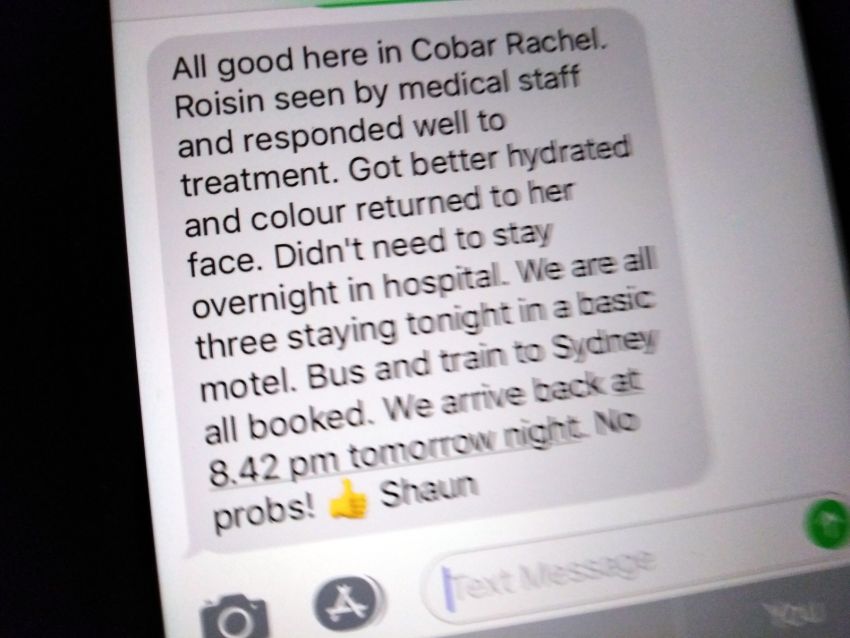
Fellow passenger Helen reads out a text received from Dr Shaun Matthews, who says he and the other passengers are OK and due back in Sydney at 8pm tomorrow. George, who is now awake, jokes: "They'll arrive just before us."
The bus is bouncing so much, it takes me several attempts to to get a clear photo of the text.
1.05am It looks like we may run out of fuel
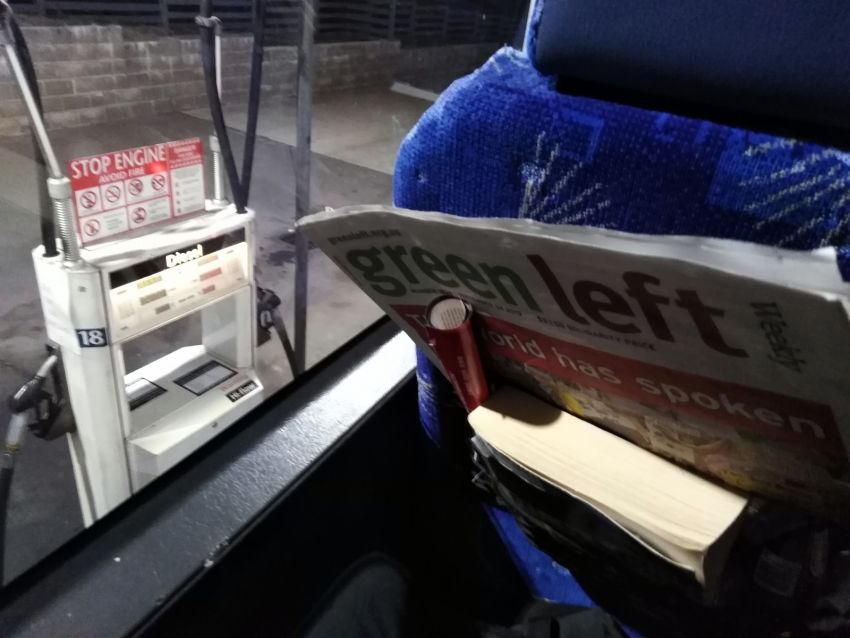
Most passengers on the bus are asleep, pressed against windows or sprawled across seats. George is cackling with laughter as we cannot find a Caltex petrol station in Bathurst. We need a Caltex as the bus company has a Caltex customer card. It's starting to look desperate. As we climb a hill, Rachel laughs and says: "I'm gonna be a rich lady - do you know why? I can make fuel gauges go up!"
At 1.26am, there's an air of relief as we find a Caltex.
3.07am We arrive in Katoomba
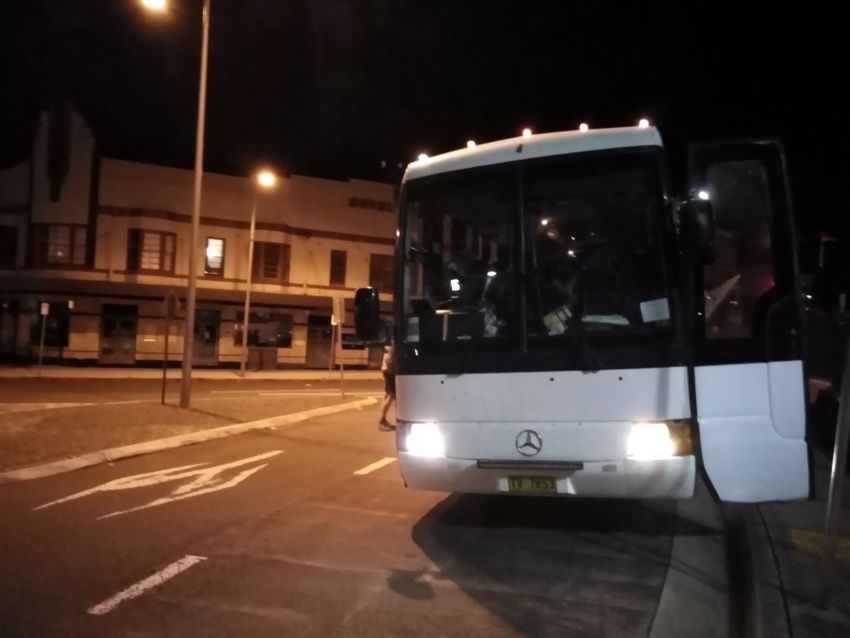
As we approach Sydney's Blue Mountains, Rachel talks with George about the bus booking fiasco, in which the booking company had expected one driver to drive for 14 hours non-stop. "My GPS was telling me we'd get into Sydney past 4am anyway," she says. That would make the journey 21 hours non-stop.
"These booking companies don't know anything about fatigue laws," she says. "They're putting people's lives at risk. They had us booked down for another job straight after this."
4.20am We drive back through the Westconnex monstrosity
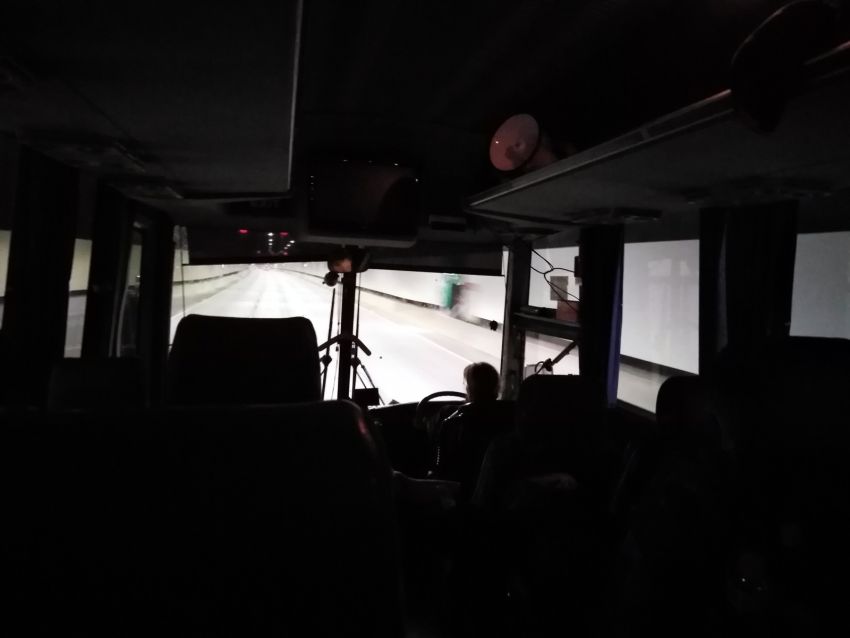
Sadly, the $45 billion toll tunnel is still standing.
4.44am We arrive back in Sydney
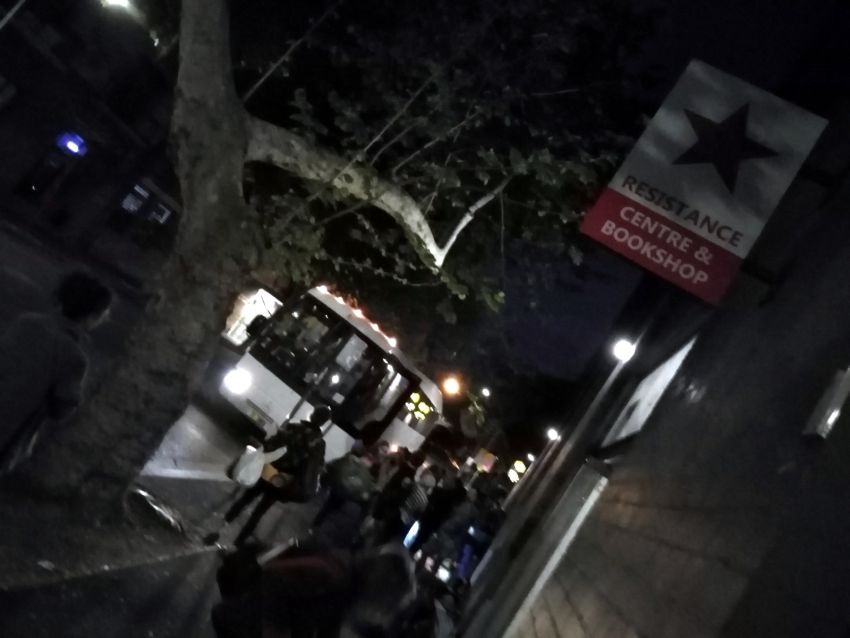
We pull up outside the Resistance Centre & Bookshop below Green Left Weekly's office, just off Broadway. Everyone piles out of the bus looking bleary-eyed. I call a cab and we say our farewells to the group.
In the taxi back home, I turn to my son and ask: "So, what did you think of the trip?"
"We've got to keep protesting," he says.
I wrote this blog to raise awareness of the #WaterForRivers campaign. If you found it interesting, please share it. Day 1 can be found here. Thank you.
The multi-award-winning journalist John Pilger says: "There are few other newspapers — radical or any other kind — that draw together news and analysis that is as well informed, credible, and non-sectarian as Green Left Weekly. Its work has influenced mine and has been a beacon to those who believe the press ought to be an agent of the people."
Comments? Criticisms? Corrections? Email [email protected]
[Mat Ward has been writing for Green Left Weekly since 2009. He also wrote the book Real Talk: Aboriginal Rappers Talk About Their Music And Country and makes political music.]